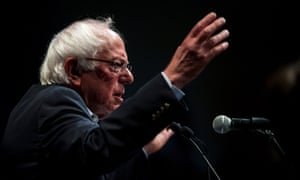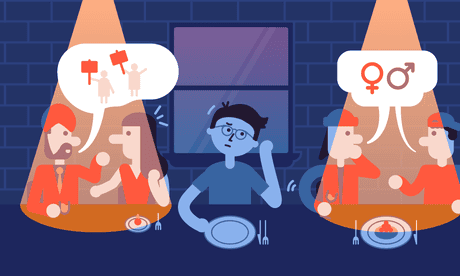It's Bernie's world. The Democratic party is just living in it
Bernie Sanders's 2016 candidacy rewrote the rules by which the Democratic party operates. If Democrats win in 2020, it will be largely thanks to him
Bernie Sanders declared on Tuesday that he will once again run for president. Whatever this election season holds for him, he's already the most important candidate in the race.
Emerging seemingly out of nowhere, Sanders's first Democratic primary run in 2016 brought tens of thousands of people – millennials especially – into the work of politics, not just to cast a ballot but to knock on doors and phone bank, host community meetings and wrangle straws in Iowa. Among them was the now representative Alexandria Ocasio-Cortez, who has credited her organizing on the Sanders campaign for helping to reignite her interest in politics.
Sanders didn't win, of course. But the results of his campaign defied all conventional horse-race logic. The man widely expected to be little more than an off-brand Dennis Kucinich won 23 states and 47% of pledged party delegates. In all, over 13 million people voted for an avowed democratic socialist.
In the wreckage of Hillary Clinton's historic loss, it became abundantly clear that the Democratic party's center could not hold. Sanders – now joined by Ocasio-Cortez and a new generation of left-leaning politicians –have given a party that lacked ideas and momentum a new lease on life. Indeed, it's painful to imagine what the Democrats would be doing without them. (Fighting for tax credits to put solar panels on Trump's border wall, perhaps? Or lowering prescription drug prices for prisoners fighting wildfires in California? We can only speculate.)
Instead, the types of ideas laughed off in the 2016 primary as "magical unicorns" are now firmly in the party's mainstream, even as they make its top brass sweat. Sensing a change in the political weather, skilled politicians who built their careers as sensible, business-friendly moderates, like Kirsten Gillibrand and Cory Booker, are rebranding themselves as bold progressives to vie for the party's presidential nomination. Each has backed once fringe-left proposals such as Medicare-for-All, a federal job guarantee and a Green New Deal – all of which are hugely popular among voters. Young voters especially – on the cusp of becoming the country's largest voter demographic – want a candidate who will do more than pay lip service to progressive ideals. As a result, several 2020 candidates now sound more like Sanders than their former selves.
And though they may still run, shifting waters have made old guard figures like Joe Biden and billionaires Michael Bloomberg and Howard Schultz look increasingly – and accurately – like out-of-touch dinosaurs.
Sanders's 2016 candidacy wrote the rules by which the Democratic party is now operating, and that will ultimately help it beat Trump in the general election. Ironically, his remarkable success could make this primary run harder for him than the last. Unlike his battle against Hillary Clinton, this election will see Sanders – no longer an unknown outsider – try to differentiate himself from a field of candidates with platforms not all that different from his own, most notably Elizabeth Warren.
That said, while Sanders's ideas won't set him apart from this field as dramatically as they did in 2016, his authenticity still might. Harris, Gillibrand and Booker are all recent converts to big progressive policies. Sanders has been saying the same thing for 40 years – almost comically so. That he is constitutionally incapable of lying has been a major part of his appeal, and a stark contrast from polished party functionaries willing to change their tune to suit a new poll or donor. The onus will be on candidates newly gravitating toward left ideas to prove their endorsements of progressive policies are more than just empty talking points.
What remains unique about Sanders, too, is his long-held belief that political change is driven from below. As other candidates pitch their own progressive bona fides, Sanders will pitch a political revolution. Investing too much faith in any one person is a dangerous thing, particularly in an office as fraught as the American presidency – for him, just a means to an end. Sanders is all too aware that he'll need an army at his back to get anything done should he win. Accordingly, he'll treat his campaign as an opportunity to train them into fighting shape.
The Democratic party is stronger for Sanders having thrown his wrench into its coronation plans two years ago. And we're all better off. It's painfully easy to imagine two years of an electoral news cycle orbiting around personality beefs and debates about "electability" instead of, say, the looming collapse of human civilization. With as few as 11 years left before the climate crisis veers into a full-on global catastrophe, the presidential race needs to be a place to debate issues, not individuals. With Sanders on the scene, we can rest assured that it will be.
Bernie Sanders showed us that another world is possible. If that world becomes a reality, we'll have him to thank – whether he becomes president or not.





No comments:
Post a Comment